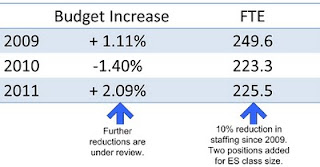 In December the Bronxville Board of Education adopted a goal of developing a 2011 school budget that “supports high quality teaching, programs, services, and operations.” The Board of Education is now engaged in the process of determining how best to accomplish that goal in a manner consistent with long-term fiscal prudence.
In December the Bronxville Board of Education adopted a goal of developing a 2011 school budget that “supports high quality teaching, programs, services, and operations.” The Board of Education is now engaged in the process of determining how best to accomplish that goal in a manner consistent with long-term fiscal prudence.The last two years have seen vigorous efforts to contain costs, with an increase of 1.11% in 2009 and a decrease of 1.4% in 2010. Our current budget reflects the following cost containment measures:
- Voluntary wage concessions by administrators
- Retirement incentives generating significant salary savings
- Electing not to fill certain vacancies (3.5 positions)
- Eliminating 2.7 clerical positions
- Outsourcing custodial services (16.9 positions)
- Discontinuing the FLES program (1.6 positions)
- Streamlining the delivery of skills program and advisory program
- Eliminating selected assistant coach and club adviser positions.
The Superintendent’s proposed budget for 2011 continues on the path of fiscal restraint, showing a year-to-year increase of 2.09%. This “rollover” budget accommodates known increases in health and retirement contribution rates, and adjusts for changes in the distribution of enrollment in grades K-5 (resulting in two additional sections). It also incorporates new information about three retirements, worker compensation, and various other known expenses. Most important, this proposed budget preserves the current breadth of school programs and services, far surpassing minimum requirements and state mandates. In addition to required core required programs, this budget supports:
- Science specialists in the Elementary school
- Full sequences in French, Latin, and Spanish beginning in grade 6
- Advanced placement courses in studio art, art history, music theory and composition, English language and literature, world history, US history, foreign languages, statistics, two levels of calculus, environmental science, chemistry, biology, and physics
- K-8 skills support for students experiencing academic difficulty
- A full range of services beyond simple compliance for students with disabilities or other handicapping conditions
- The K-5 character-building curriculum and group guidance/advisory at the Middle School
- A K-12 music program featuring the early introduction of instrumental music, the integration of technology, and a strong performance orientation at the secondary schools
- Three-year exploratory sequences in the Middle School, encompassing art, drama, computers, technology education, and home and careers
- A full range of interscholastic sports beginning at grade 7
- Co-curricular programs for community service and social action, media and publications, the arts, student government, and other special interests.
With a 2.09% increase, this proposed budget is very close to anticipated property tax caps of 2%. If enacted, such a cap would not affect the 2011 budget, but as we plan for the future it serves as one useful benchmark of sustainability. Labor negotiations - now in process - are a crucial component of achieving long-term stability.
In order to arrive at an approved budget, the administration has also proposed additional reductions in clerical staff, administrative resources, and teaching assistant positions. If accepted, these measures would bring the proposed budget-to-budget increase down to 1.57%. For each item the administration is preparing impact statements to discuss and analyze at the March 5 budget workshop (9 AM in the Multi-purpose Room).
We further recommend that the Board apply some of its reserves as a further way to bring down the tax levy, as it has done in the past. If the Board allocated $200,000 from the ERS and tax cert reserves, the proposed budget to budget increase drops to 1.11%, with an associated tax levy of 1.5%.
A 0% increase would require a further reduction of about $577,603, which could come from several different sources. This amount is the equivalent of 6.6 teaching positions (based on a Master’s degree, step 5). Reductions at this level would have a direct bearing on teaching and learning, significantly affecting program quality and opportunities for students:
- Increasing Elementary class sizes
- Scaling back or eliminating non-mandated Middle School exploratory subjects
- Reducing High School core departments and guidance.
We also believe it would be unwise not to support our five-year capital plan; we should maintain the proposed level of capital funding needed to carry out recommended improvements in our heating and ventilation system as identified in our building conditions survey. (The budget does not contain funding for major projects such as Middle School science labs or the auditorium.)
As we go through the budget process, listening to various constituencies and analyzing the trade-offs involved in various alternatives, we hope that we can sustain a positive climate and reduce uncertainty by indicating the scope of possible reductions early in the process. It is also important for us to take a long range view of the future and consider not only the short-term bottom line in this particular budget year but also the relationship between school quality and the longer-term interests of the community. In this manner we believe we can deliver a budget that falls within expected property tax caps (“sustainability”) but also honors our highest aspirations for children (“excellence”).
